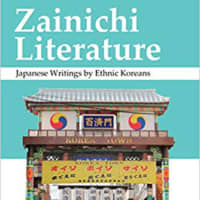The recent success of Min Jin Lee's novel "Pachinko" has raised interest in the experience of Zainichi (ethnic Koreans living in Japan). A product of postwar Japan and virtually unknown internationally, Zainichi literature often explores the nature of exile and the conflict of identity between homes. Unable or unwilling to return to Korea after the end of the Japanese occupation, past Zainichi often seemed out of place in both countries. But the distinctive voices in this collection, a labor of love compiled with an eye for discovery, show that Japanese literature is enriched by diversity.
Zainichi Literature: Japanese Writings by Ethnic Koreans, Edited by John Lie.
206 pages
INSTITUTE OF EAST ASIAN STUDIES PUBLICATIONS, Essays.
The essays, short stories and tanka poems range from Yang Sogil's testosterone-fueled "In Shinjuku" to the poignant "I Am Twelve" by Masafumi Oka, a collection of notebook poems written before the boy's suicide in 1974. A more recent voice is the reliably outlandish "Specimens of Families" by Yu Miri, who earlier this year made a splash with her novel "Tokyo Ueno Station."
Alienation abounds, but there is no rejection of Japan, no overt grudges about discrimination in these writings. As editor Lie notes in the introduction, the Zainichi population has become more diverse and assimilated, with high rates of out-marriage and naturalization. No longer a postcolonial phenomenon, these samples of Zainichi literature strike universal chords about the need to create and believe in a home, a sentiment wistfully rendered in "Nagune Taryong: Eternal Traveler," a collection of tanka poems by Lee Jungja: "On the verge of my wandering heart/ I attempt to love/ Japan's wind."



